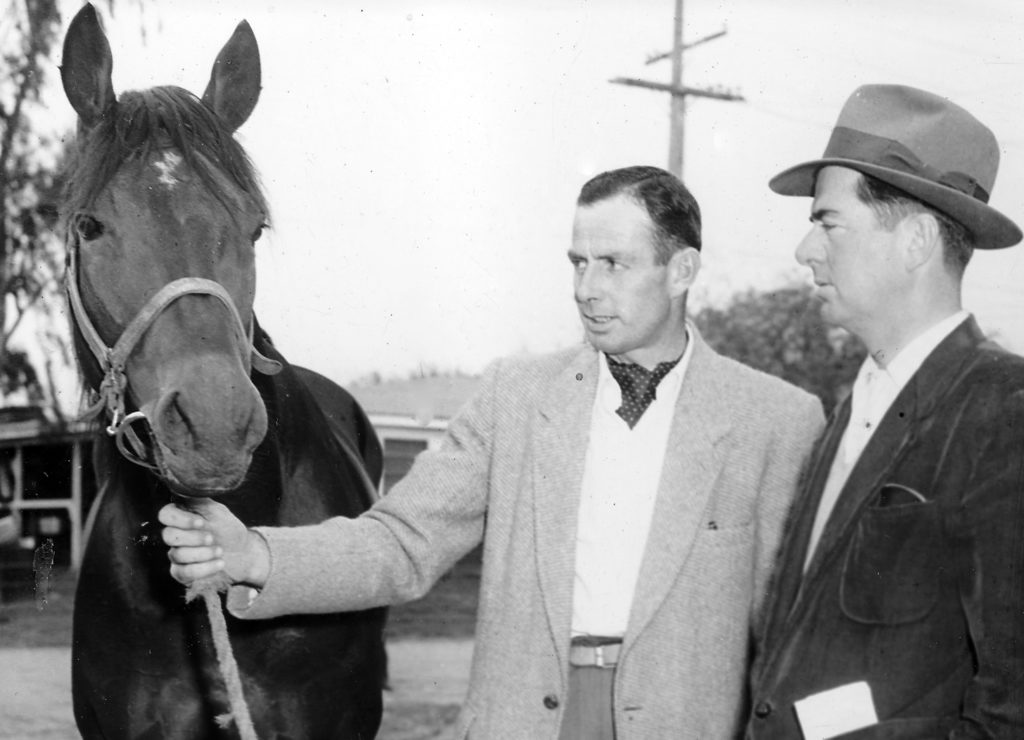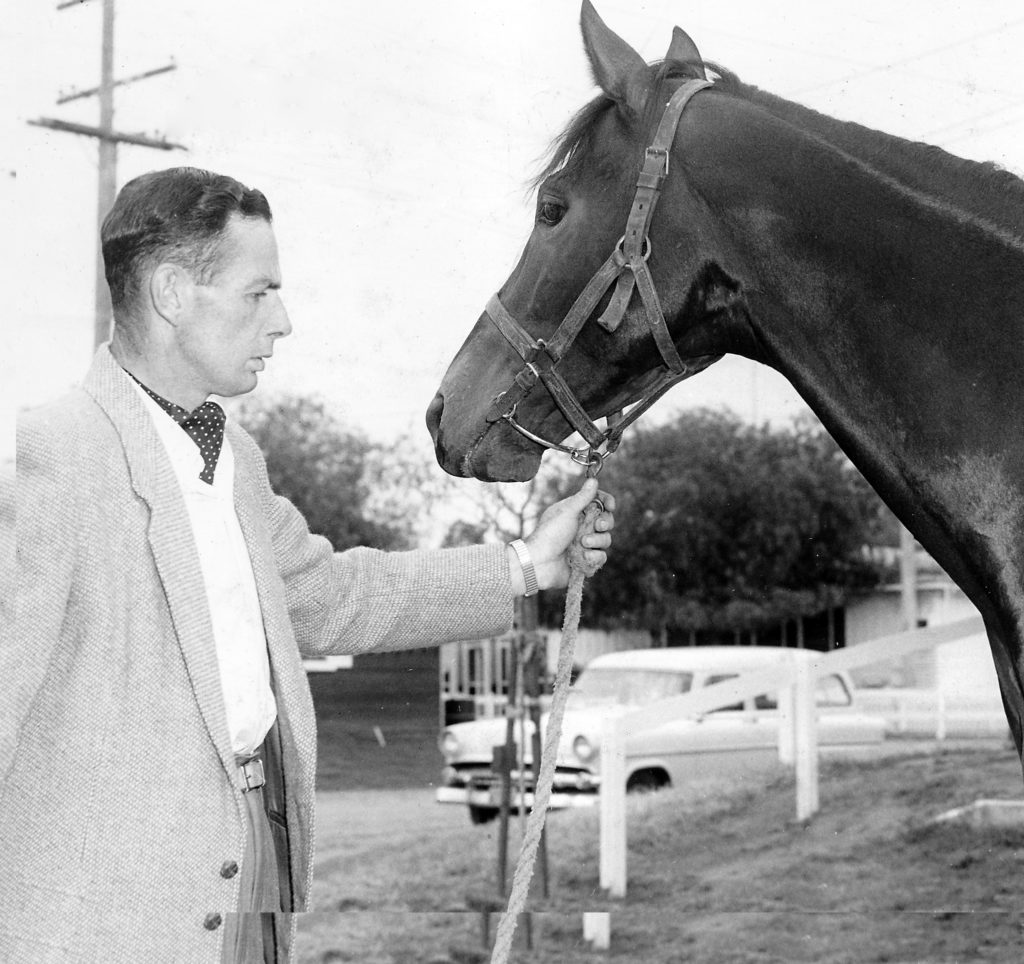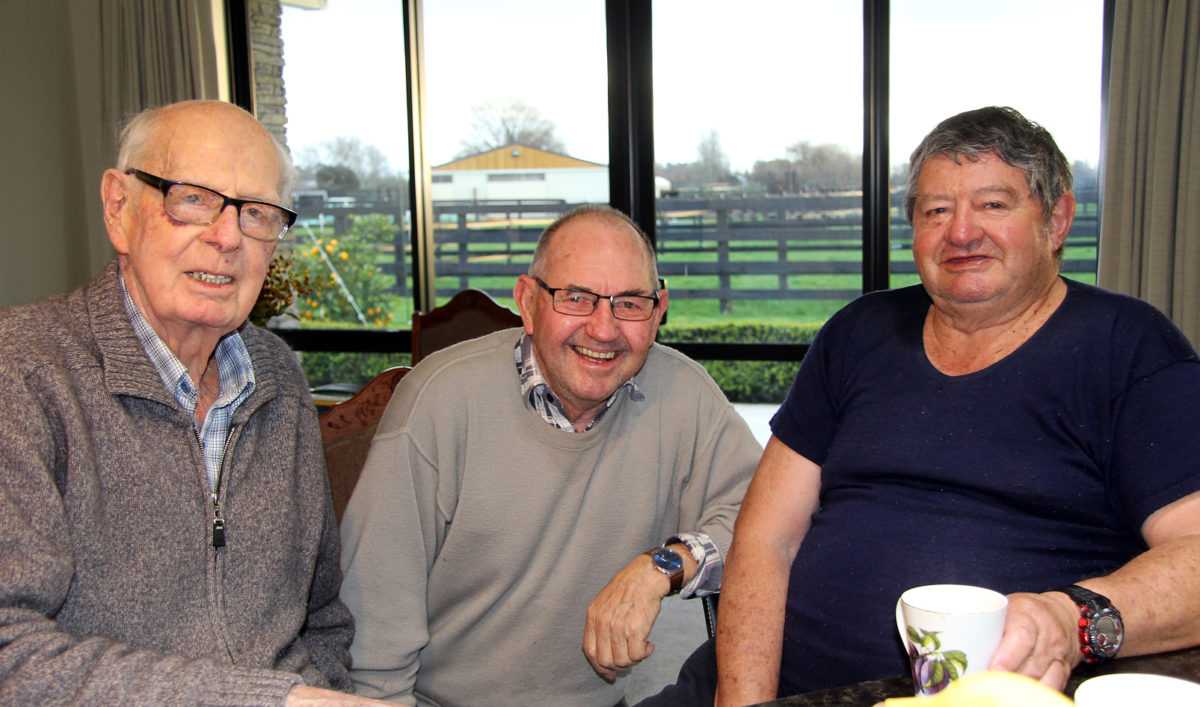Above: Bob Morris (left) with friends and retired trainers Don Sellwood (middle) and Royce Dowling at Bob’s Cambridge home earlier this year
by Brian de Lore
Published 31 October 2019
‘A wonderful life in horses,’ is how I would describe the life of my close friend Bob Morris, who passed away in Cambridge on October 17th, one month short of his 92nd birthday.
In Bob’s passing, New Zealand lost one of the very best horsemen it’s ever known. He was also one of the great characters, a great stockman, a great mentor to many successful people in horses, and in his own right, very successful as an owner, trainer and breeder.
Robert Lloyd Morris was born in Cambridge in 1927, and it was there he lived for almost his entire life. He was a man who commanded unending respect from all who knew him. He was a man of the land who had an extraordinary knowledge of farming stock and thoroughbred horses.
A quiet achiever, he avoided taking credit for anything, or for helping anyone who needed help; he often shared his vast knowledge to the thoroughbred fraternity. He was a man of decisive action who didn’t suffer fools but equally was kind of heart, a loyal friend, and a man who liked his steak medium-rare.
He bred and raced numerous top horses over a long period. His most significant success as a breeder came with the Geoff Murphy trained Abdul in the 1970 W.S. Cox Plate. Abdul also won the C.F. Orr Stakes, the Sandown Guineas, the AJC All-Aged Stakes and the Liverpool City Cup.
He also bought and raced Savoir (Sovereign Edition) which won the 1000 Guineas at Caulfield, and the VRC Wakeful Stakes at Flemington, and on numerous occasions was second to Champion Filly Surround in the 1976/77 season.
In 1956 when aged 29, Bob took Sir Woolf Fisher’s outstanding sprinter, El Khobar, by ship to America after the horse had a string of victories in both New Zealand and Australia. The son of Gabador won the BATC Doomben Ten Thousand Guineas, The Ascot Stakes, and the AJC Warwick Stakes.

In Brisbane in 1956, he also won a match race with Syntax by eight lengths and was the best sprinter in Australia that year. El Khobar also had a successful race career in the USA before retiring to stud, firstly in the USA, and then back in New Zealand at Sir Woolf’s Ra Ora Stud at East Tamaki.
The accompanying photo of Bob with El Khobar in the USA surfaced only after Bob’s death. Although Carol Marshall worked for Bob, and was with him for 47 years, she had never before been shown the El Khobar photos – Bob wasn’t one to promote himself, even to the smallest degree.
Bob never married and is survived by his older sister Grace and his nieces and nephews, and Carol Marshall, who worked for Bob and lived with him and his older sister Margaret for all her working life before Margeret’s passing only three years ago at age 94.
His best friend was the late Maurice Paykel of Fisher & Paykel fame. They were very similar characters, completely devoid of ego but realists, intelligent, and they shared a good sense of humour and a passion for horses. Bob was the practical horseman and Maurice was the enthusiast, and together they bred and raced many horses together over many years.
Maurice Paykel turned down two knighthoods during his lifetime, which was the measure of his humility, and Bob, like his friend preferred to stay under the radar Both were humble men to a fault, and close friends.
Together they bred and raced both the Hermes mare Sequitur and her daughter, Sequita, by Sovereign Edition. Both fillies/mares were multiple black-type winners.
When Maurice Paykel died aged 88, one obituary said: “Paykel has been described as a caring person, always adhering to high standards.” That was also Bob Morris to a T. Bob was the most punctual of men and detested latecomers and the thought of being late. When off the farm, he was a dapper dresser and always wore a hat to the races.

In the early days of Cambridge Stud, Bob had a significant influence on the preparation of yearlings and was a big help to Sir Patrick Hogan in getting the Stud established.
Sir Tristram’s first stud groom John White (aka Whitey) described Bob as “an outstanding horseman and outstanding with all stock, for that matter. Even with the cranky old Sir Tristram, Bob used to clip his mane, and all the yearlings manes, with a pair of hand shears. Because Bob was tall and skinny, he could stand up beside Paddy and do the perfect job on a difficult horse.
“His horsemanship was outstanding to watch,” said Whitey. “In his lunge, he had a rope across the top to which he tied to the horses, and if the horse had a go, or fell over, that rope had enough slack, and the horse wouldn’t hit his head on the ground.
“I can’t say enough about the man, to be honest,” continued Whitey. “He was a strong man, and he could fire-up if he saw any poor horsemanship. But over the years he gave me a lot of good advice, especially on buying and selling horses. A lot of the best advice I ever had came from Bob.”
My own friendship with Bob began in the late 1970s at a Trentham Yearling Sale. In the mid-1980s I went to Ra Ora Stud only on Bob’s encouragement. He was always my mentor. I viewed him as the giant who stood out from his peers, and I know I was right.
Bob’s view about looking at horses was, that you should form an opinion within 10 seconds of looking, and never go back to change your mind. He also placed a strong emphasis on how the horse’s ears were set; he liked them large enough and properly set – “the lugs are important,” he used to say.
Bob was different in many ways. He never forced his opinion on you, but he knew if you were open to learn, or closed to fail, and he acted accordingly without fuss or condemnation. He had a way about him that was special, a way not detected by many unless you got close to him.
And those that got close to him like Carol Marshall, John White and others will know that. It was a privilege to be a small part of the life of Bob Morris – he was a special man who made a difference to a lot of horse people.
Bob lived his life by his own rules, and in the end, went out by his own rules. He hated the thought of being a burden; he hated the thought of incapacitation from his deteriorating health, and in the end, he beat that inevitability by exiting on his own terms – the determination and courage he displayed throughout his life stayed with him to the very end.
RIP Bob, you were a colossus amongst horsemen (although you would hate reading this and probably deny it), and your memory is now etched into the annuals of man-equine immortals.

